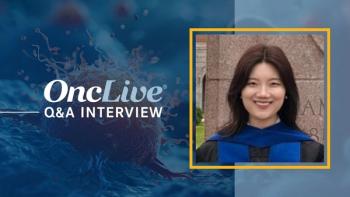
FDA Approval Insights: Brexucabtagene Autoleucel in Relapsed/Refractory MCL
In our exclusive interview, Michael Wang, MD, discusses the FDA approval of brexucabtagene autoleucel in mantle cell lymphoma and ongoing research aimed at optimizing the safety and persistence of the product.
Welcome to a very special edition of OncLive® On Air! I’m your host today, Caroline Seymour.
OncLive® On Air is a podcast from OncLive, which provides oncology professionals with the resources and information they need to provide the best patient care. In both digital and print formats, OncLive covers every angle of oncology practice, from new technology to treatment advances to important regulatory decisions.
Today, we had the pleasure of speaking with Michael Wang, MD, a professor in the Department of Lymphoma and Myeloma in the Division of Cancer Medicine at The University of Texas MD Anderson Cancer Center, to discuss the FDA approval of brexucabtagene autoleucel (Tecartus; formerly KTE-X19) in relapsed/refractory mantle cell lymphoma (MCL).
On July 24, 2020,
Data from the phase 2 ZUMA-2 trial served as the basis for the regulatory decision. The results showed that a single infusion of the CD19-directed CAR T-cell product elicited an 87% objective response rate, as assessed by an Independent Radiologic Review Committee, and a complete response rate of 62% in patients with heavily pretreated relapsed/refractory MCL.
The FDA approval of brexucabtagene autoleucel marks a significant milestone for the field of MCL, according to Wang.
In the trial, patients were allowed to receive bridging therapy for progressive disease at the investigator’s discretion. This could include ibrutinib (Imbruvica), acalabrutinib (Calquence), or dexamethasone, but not chemotherapy. Beginning 5 days prior to T-cell infusion, patients received 3 consecutive days of conditioning chemotherapy with fludarabine at 30 mg/m2 plus cyclophosphamide at 500 mg/m2. KTE-X19 was administered as a single infusion at 2 x 106 cells.
Patients enrolled on the trial had a median age of 65 years. The majority of patients had stage IV disease, and 56% had intermediate- or high-risk disease. The Ki-67 proliferation index was at least 50% in 69% of patients and 17% had TP53 mutations. Bone marrow involvement was found in 54% of patients, and 56% had extranodal disease. The most common morphologies were classical, blastoid, and pleomorphic.
The median number of prior therapies was 3. However, the majority of patients had received at least 3 treatments. Almost all patients had received prior anthracycline or bendamustine, and 100% of patients had received a prior anti-CD20 antibody. BTK inhibitors had been given to 100% of patients prior to study entry. Moreover, 37% of patients received bridging therapy, most commonly with ibrutinib. Of those who received bridging therapy, most had higher disease burden prior to infusion of the CAR T cells compared with baseline.
In the primary efficacy analysis, which was presented during the 2019 ASH Annual Meeting, the median progression-free survival (PFS) had not been reached. The 12-month PFS rate was 61%. The median overall survival (OS) had also not been reached, with a 12-month OS rate of 83%.
Regarding safety, the most common all-grade treatment-emergent adverse events (TEAEs) were pyrexia, neutropenia, thrombocytopenia, anemia, and hypotension. Grade 4 TEAEs included neutropenia, thrombocytopenia, hypoxia, and hypotension. Two grade 5 AEs were reported: the first was pneumonia related to the conditioning therapy and the second was staphylococcal bacteremia due to post-conditioning therapy and the CAR T-cell infusion.
All-grade cytokine release syndrome (CRS) and neurotoxicity occurred in 91% and 63% of patients, respectively. CRS was well managed with tocilizumab or corticosteroids. The median time to onset was 2 days, and the median duration was 11 days. Neurotoxicity was managed with tocilizumab and corticosteroids, and the median time to onset was 7 days with a median duration of 12 days.
Grade 3 or greater CRS and neurologic events occurred in 18% and 37% of patients, respectively.
In an interview with OncLive, Wang discussed the FDA approval of brexucabtagene autoleucel in MCL and ongoing research aimed at optimizing the safety and persistence of the product.




































